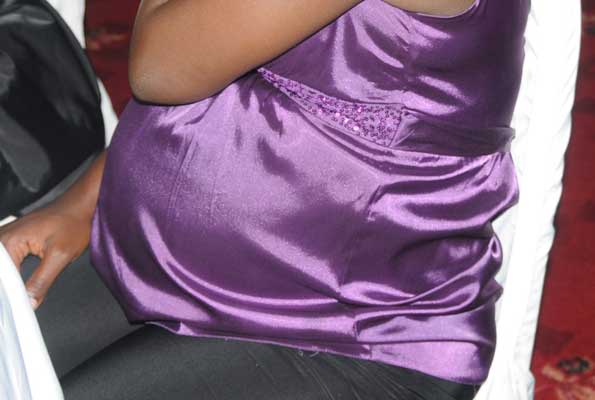The death of Cecilia Nambozo in the labour ward of Mbale Hospital,
last month, mirrors the massive problem health centres are facing all
over the country. She is just one in 16 who die everyday during
labour.
The government last Wednesday outlined a six-point ‘fire-brigade’
response to salvage the country’s ailing health care system after the
death, during labour, of a primary school teacher in Mbale District
sparked public fury countrywide.
On September 6, when Cecilia Nambozo died, 15 other expectant women also passed on, their deaths unreported, since the Health ministry says 16 would-be Ugandan mothers lose their lives in labour daily. Thus the 5,840 annual maternal deaths backpedals the country’s drive to achieve Millennium Development Goal Five of reducing maternal
mortality by three-quarters by 2015.
Nambozo’s case was not particularly unique or the first one to stir
anger. In August 2009, residents attacked Mityana Hospital after
Sylvia Nalubowa of Bussujju village died with her baby during labour
allegedly because staff wanted to take a bribe before they could
assist.
Even in the Mbale case, it was reported that medics asked for
Shs300,000, which relatives of the deceased never paid, although the
allegation is yet to be substantiated. Government’s blue-print issued
by Health minister Christine Ondoa says their preliminary
investigations showed Nambozo died due to “negligence” by the health
workers. She said: “Investigations are still going on and that
disciplinary action will be taken on all health workers implicated in
the incident.”
Already, police arrested senior medical staff that were on duty at
Mbale Hospital that fateful day and the Director of Public
Prosecutions is studying the evidence on file against them to
determine if they should be formally charged in court and prosecuted.
Dr Ondoa, herself a consultant paediatrician, in last Wednesday’s
press statement announced measures to crack the whip on all errant
medical staff while promising to make medical supplies available.
Experts say such willy-nilly pronouncements that render health workers
culpable may be music to the citizens’ ears, but masks the systematic
decay, which is at the core of failing service provision at public
health institutions.
Already public health institutions such as Mbale Hospital routinely
report stock-out of essential drugs and supplies alongside shortage of
already poorly-remunerated but overwhelmed staff. It is understood
that some 12 midwives that the Health Service Commission recruited and posted to Mbale Hospital declined to take up the job.
Our investigations show that on the day Nambozo died, 11 hours after
reporting to the health facility, the hospital was apparently being
manned by interns. It had had no sutures (stitch threads) for more
than two months and every expectant mother was required to come along with stitching threads.
The only medical officer on duty, an obstetrician, Mercy Nassali, had
been in the one-bed theatre from morning and exhausted by the evening hours when the condition of Nambozo, who initially appeared likely to give normal birth, worsened. The obstetrician, with the help of one intern doctor, was at the material time attending to a woman with arm prolapse.
Arm prolapse is a condition during which a baby’s hand presents first
to obstruct labour, making it one of the “most serious” delivery
emergencies, according to Dr Rogers Ayiko, a maternal and child health
specialist, working for Doctors with Africa (CUAMM), an Italian health
organisation.
He said such an emergency can make the unborn baby
suffocate and is usually treated as a first priority to handle. Two
other interns continued handling all patients presenting with labour
complications while one midwife monitored the progress of nine other
women who had reportedly given birth at the hospital.
Dr Daniel Zake, a gynaecologist at Nsambya Hospital, a private
facility, said every maternity bed should be attended to by at least
two midwives. Health workers at public health facilities, however,
told us a midwife at a government facility handles anywhere between
four to 10 expectant women in a day.
This appears to have been the case with the lone midwife on duty at Mbale Health facility on September 6, who was taking care of nine new mothers, resulting in fatigue and diminished quality of care.
Health Minister Ondoa in a separate interview on Friday, said that the
World Health Organisation (WHO) has lately revised its definition of a
health worker to mean a combination of a doctor, nurse and midwife.
Under the health agency’s new guideline, such a cadreship of medical
professionals should handle 1,000 people. “If a country has less than
2.5 health workers per 1, 000 population, that country is in crisis,”
Dr Ondoa said. Uganda is operating significantly below the new WHO
standard.
The minister said the country’s present situation is “bad because we
don’t have enough health workers, but it is looking the future is
going to be good”. Why? Dr Ondoa said in the month of September alone, they recruited 150 health professionals and posted them to health facilities most in need and a total 1, 000 new health workers are
likely to be employed by end of next year if ongoing negotiations with
development partners succeed.
It is understood Nambozo’s uterus ruptured with the overweight baby
around 7pm and she wasted away fast because there was no blood stock at both Mbale Hospital and the Regional Blood Bank to transfuse her.
Her relatives had not bought the required sutures either. The National
Medical Stores that manages the budget for drugs and medical supplies
of all public health facilities had allegedly not supplied the
post-surgery stitch threads to the hospital in more than two months.
This newspaper understands that when Nambozo’s health deteriorated
sharply, the health workers decided to pick sutures from another
patient and rushed her into the theatre. Already acutely anaemic, she
was pronounced dead at 8.30pm.
Her demise, which Ministry of Health Spokesperson Rukia Mbaziira attributes to false starts by the health workers, exposes the many inadequacies and failures in Uganda’s health systems separately documented in an ad hoc report prepared by the Foundation for Human Rights Initiative (FHRI).
Asked why the government has accused the health workers of negligence when they appeared stretched to the limit amid a dearth of medical supplies, Ms Mbaziira, who admitted “some health system challenges”, said it was incumbent upon decision makers there to summon staff who were off-duty once it determined the workload was overwhelming.
In the meantime, she said, the ministry had decided to absorb all of
this year’s intern doctors on one-year temporal arrangement until the
Health Service Commission formally recruits them at a later date.
FRHI’s 2010 report titled, “The Right to Health Care in Uganda”, shows
the government is in default on its commitments to health; its
allocation of 9.8 per cent of the national budget this fiscal year to
the sector, down from 10.3 per cent in the 2009/10 FY, contrasts with
the 2001 Abuja Declaration that obliges African states to dedicate at
least 15 per cent of their revenues, excluding donor financing, to
health.
Uganda had prior to the declaration accelerated its allocation to
health as a share of the national budget from four percent in 1997 to
nearly 17 per cent in 2000 before dropping the vote to below 12 per
cent in 2003 and 2006.
It was within the period of higher funding to the health sector that
the country shone internationally as a poster child for fighting
HIV/Aids, although much of the money came from donors. That
notwithstanding, the positive results showed in part that increased
investment in health – when officials do not pilfer the resources for
self-enrichment – improves citizens’ welfare and productivity. But
this financial year, the government has engaged a reverse gear and
slashed the Ministry of Health allocation to just 9.8 per cent of the
national budget, injecting more money instead into infrastructure
development.
The Regional Network for Equity in Health in East and Southern Africa
(EQUINET), which monitors the implementation of the Abuja Declaration,
in April 2008 reported vast fluctuations. It noted: “This research
demonstrates that some seven years after the Declaration, many of the
countries are still lagging well behind this target…”
That same year, Nobel Peace Prize Winner Archbishop Desmond Tutu, who is the honorary chair of the ‘Africa Public Health Alliance 15 per
cent Now Campaign’, urged African Heads of State and government not to in any way “revise, drop or further delay implementing the Abuja
Declaration”.
Describing the Declaration as the “most important” commitment African
leaders had made towards health financing and development, Archbishop Tutu said: “The continued loss of millions of African lives annually, which can be prevented, is unacceptable and unsustainable. Our leaders know what they have to do. They have already pledged to do it. All they have to do now is actually do it. This is all we ask of them.”
Even when there is marked growth in the number of health facilities,
improving access in parts of Uganda to a four kilometre radius,
according to the 2006 household survey, physical availability of the
infrastructure has not been matched by improved health services
because drugs, diagnostic machines and qualified personnel are
lacking. For example, HRFI researchers found during their study
carried out for six months (January to June 2010), and covering nine
districts, that people in rural areas, frustrated by lack of doctors
and medicines, are increasingly turning to mushrooming yet unregulated
traditional healers for treatment.
Worse still, in most rural areas, as is the case at some urban health
facilities, ambulances are either non-existent, not fueled or in
disrepair to effect transfers during referrals.
The FHRI reported that the government of Uganda is obsessed with
physical presence of health structure but not their functionality. It
also questions the rationale of the National Medical Stores (NMS)
having to manage budgets of all public health institutions when some
lower-tier health centres can hardly quantify their drug requirements
over months, resulting in stock-outs. As such, patients return with
their prescription forms home, staying for sometimes weeks without
medication, and turn up to swamp health centres when they catch wind of delivery of drugs.
The government appears aware of just how the failing health system has exposed it.
In the Wednesday’s press statement, Ondoa announced commencement of maternal and perinatal death audits at health centres to determine their possible causes and recommend implementable control measures.
Many observers say the government knows the hamstrings but is just
dithering to fix it – in the process leading public health institution
that offer treatment on the cheap to atrophy as private ones, many
owned by bureaucrats, thrive.
The good news is that Dr Ondoa says this time around her ministry is
determined to provide mama or delivery kits, unlike presently where
NMS charges for their supplies, to hospitals and all village health
teams at no cost; more health centres will be built and blighted ones
renovated and mass sensitisation undertaken to educate Ugandans on
safe delivery methods.
It is hoped these measures will propel Uganda to the league of nations
that have reduced maternal and child mortality but it is uncertain if
the hand of the first female Health minister will indeed heal Uganda’s
ailing health sector.
Source: Daily Monitor
http://www.monitor.co.ug/Magazines/Health+++Living/-/689846/1247262/-/mc1l4vz/-/index.html
 in Adjumani district are mooting a by-law that will penalise women who give birth from home.
in Adjumani district are mooting a by-law that will penalise women who give birth from home.
